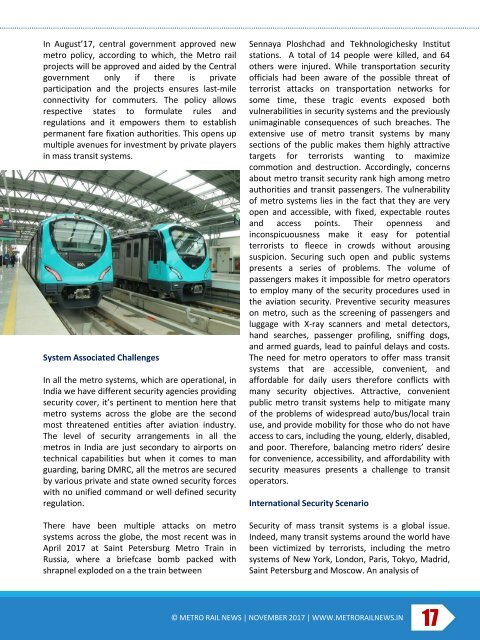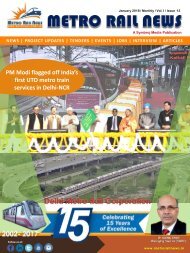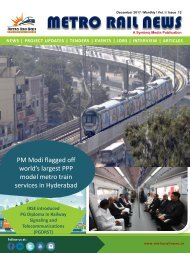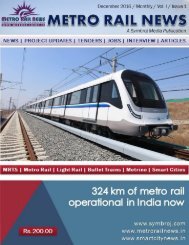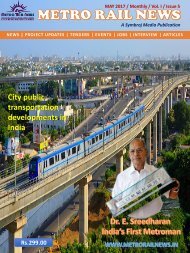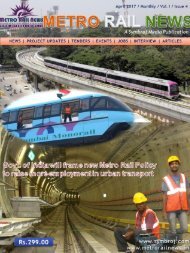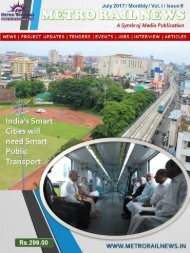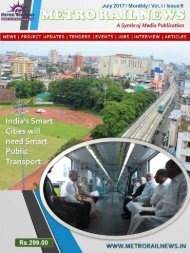Metro Rail News November 2017
Monthly magazine with special focus on Urban Mobility, Metro Rail Projects, Mass Rapid Transit Systems, High Speed Rail Project, Smart Cities Projects etc.
Monthly magazine with special focus on Urban Mobility, Metro Rail Projects, Mass Rapid Transit Systems, High Speed Rail Project, Smart Cities Projects etc.
You also want an ePaper? Increase the reach of your titles
YUMPU automatically turns print PDFs into web optimized ePapers that Google loves.
In August’17, central government approved new<br />
metro policy, according to which, the <strong>Metro</strong> rail<br />
projects will be approved and aided by the Central<br />
government only if there is private<br />
participation and the projects ensures last-mile<br />
connectivity for commuters. The policy allows<br />
respective states to formulate rules and<br />
regulations and it empowers them to establish<br />
permanent fare fixation authorities. This opens up<br />
multiple avenues for investment by private players<br />
in mass transit systems.<br />
System Associated Challenges<br />
In all the metro systems, which are operational, in<br />
India we have different security agencies providing<br />
security cover, it’s pertinent to mention here that<br />
metro systems across the globe are the second<br />
most threatened entities after aviation industry.<br />
The level of security arrangements in all the<br />
metros in India are just secondary to airports on<br />
technical capabilities but when it comes to man<br />
guarding, baring DMRC, all the metros are secured<br />
by various private and state owned security forces<br />
with no unified command or well defined security<br />
regulation.<br />
There have been multiple attacks on metro<br />
systems across the globe, the most recent was in<br />
April <strong>2017</strong> at Saint Petersburg <strong>Metro</strong> Train in<br />
Russia, where a briefcase bomb packed with<br />
shrapnel exploded on a the train between<br />
Sennaya Ploshchad and Tekhnologichesky Institut<br />
stations. A total of 14 people were killed, and 64<br />
others were injured. While transportation security<br />
officials had been aware of the possible threat of<br />
terrorist attacks on transportation networks for<br />
some time, these tragic events exposed both<br />
vulnerabilities in security systems and the previously<br />
unimaginable consequences of such breaches. The<br />
extensive use of metro transit systems by many<br />
sections of the public makes them highly attractive<br />
targets for terrorists wanting to maximize<br />
commotion and destruction. Accordingly, concerns<br />
about metro transit security rank high among metro<br />
authorities and transit passengers. The vulnerability<br />
of metro systems lies in the fact that they are very<br />
open and accessible, with fixed, expectable routes<br />
and access points. Their openness and<br />
inconspicuousness make it easy for potential<br />
terrorists to fleece in crowds without arousing<br />
suspicion. Securing such open and public systems<br />
presents a series of problems. The volume of<br />
passengers makes it impossible for metro operators<br />
to employ many of the security procedures used in<br />
the aviation security. Preventive security measures<br />
on metro, such as the screening of passengers and<br />
luggage with X-ray scanners and metal detectors,<br />
hand searches, passenger profiling, sniffing dogs,<br />
and armed guards, lead to painful delays and costs.<br />
The need for metro operators to offer mass transit<br />
systems that are accessible, convenient, and<br />
affordable for daily users therefore conflicts with<br />
many security objectives. Attractive, convenient<br />
public metro transit systems help to mitigate many<br />
of the problems of widespread auto/bus/local train<br />
use, and provide mobility for those who do not have<br />
access to cars, including the young, elderly, disabled,<br />
and poor. Therefore, balancing metro riders’ desire<br />
for convenience, accessibility, and affordability with<br />
security measures presents a challenge to transit<br />
operators.<br />
International Security Scenario<br />
Security of mass transit systems is a global issue.<br />
Indeed, many transit systems around the world have<br />
been victimized by terrorists, including the metro<br />
systems of New York, London, Paris, Tokyo, Madrid,<br />
Saint Petersburg and Moscow. An analysis of<br />
© METRO RAIL NEWS | NOVEMBER <strong>2017</strong> | WWW.METRORAILNEWS.IN<br />
17


